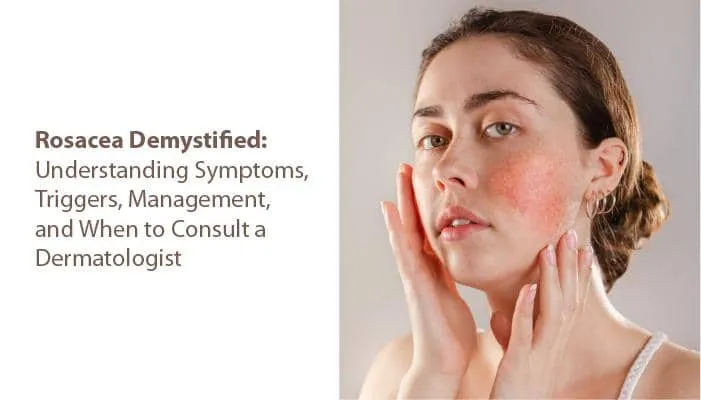Rosacea Demystified: Understanding Symptoms, Triggers, Management, and When to Consult a Dermatologist
October 3, 2023
Introduction:
Rosacea as a chronic skin condition that affects the face, causing redness and visible blood vessels.
The blog will explain its symptoms, common triggers, strategies for managing rosacea, and the importance of consulting a dermatologist.
Symptoms of Rosacea:
- The hallmark symptoms of rosacea, including persistent redness, visible blood vessels (telangiectasia), and occasional acne-like bumps.
- The rosacea may also cause stinging or burning sensations, dry skin, and eye irritation (ocular rosacea).
Types of Rosacea:
- Different subtypes of rosacea, including erythematotelangiectatic, papulopustular, phymatous, and ocular rosacea. You can also divide the rosacar into different stages like Stage I is that of flushing, stage II is that of erythrocouperosis, stage III papules and pustules and stage IV rhinophyma.
Common Triggers of Rosacea:
- The common triggers that can exacerbate rosacea, such as spicy foods, hot beverages, alcohol, extreme temperatures, and stress.
- You can list of foods, beverages, skincare products & activities for a few days to identify how those things affected your skin. This will help to identify and avoid triggers.
Management of Rosacea:
- Skincare Routine: A gentle skincare routine with mild, fragrance-free products and sunscreen to protect against UV rays.
- Prescription Medications: Topical and oral medications that dermatologists may prescribe to manage symptoms, including antibiotics and anti-inflammatory creams.
- Lifestyle Modifications: The importance of managing stress, maintaining a healthy diet, and staying hydrated.
- Redness Reduction: The laser therapy can effectively reduce redness and visible blood vessels in some cases.
When to Seek Professional Help:
- Its important to consulting a dermatologist if experiencing persistent or worsening symptoms.
- The early diagnosis and treatment can prevent rosacea from progressing to more severe stages.
Conclusion:
- The key takeaways are, the importance of a gentle skincare routine, trigger identification, and timely consultation with a dermatologist.
- Seek professional guidance to manage their rosacea effectively.
Can rosacea be cured?
There is no known cure for rosacea, but it can be effectively managed with the right treatment and lifestyle adjustments.
Are there any specific foods to avoid if I have rosacea?
While trigger foods can vary from person to person, common triggers include spicy foods, alcohol, and hot beverages. Identifying personal triggers with the help of a dermatologist is advisable.
NOTICE BOARD
CONTACT US
CONTACT US
 Book Appointment
Book Appointment


.svg)
.svg)
.svg)
.svg)








